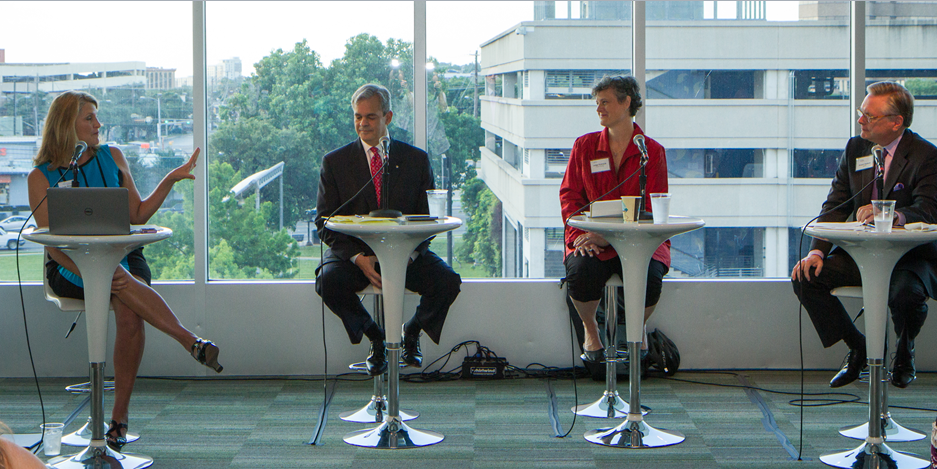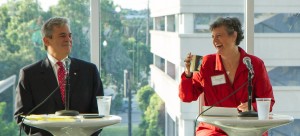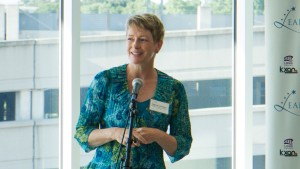
By: Elizabeth McGuire
In our final Engage Breakfast of the season, we closed with a lively discussion between two well-known local leaders: City of Austin Mayor Steve Adler and Travis County Judge Sarah Eckhardt.
To set the stage for the discussion, Dr. Regina Lawrence, Director of the Annette Strauss Institute for Civic Life at The University of Texas, presented findings from Leadership Austin’s 2015 Essential Class report on trends from last year’s 10-1 City Council election. The report is a joint effort from the Leadership Austin’ s 2015 Essential Class and the Annette Strauss Institute for Civic Life at The University of Texas. KXAN news anchor Robert Hadlock moderated the discussion and Judy Maggio, our new Engage Program Manager, fielded questions from the audience.
Some highlights from the morning:
According to the report, Dr. Lawrence explained that although community involvement is rich and vibrant in many Austin neighborhoods, political participation, voter turnout, and attendance at city council meetings has noticeably declined. “Many Ausitinites,” said Lawrence, “are simply out of the habit of making their voices heard, particularly in the political realm.”
Research also shows a tremendous variation in the way citizens view the city in terms of their experiences, their sense of identification with the larger city, and their levels of engagement. That said, citizens are feeling a “cautious optimism” and a belief that the city stands at a pivotal moment of opportunity. People reported that although the 10-1 system is a good start, there is more work ahead. “People across the city voiced the desire for new, different, better, more meaningful, more convenient ways to make their voices heard,” said Lawrence.
The transition to 10-1 so far
According to Mayor Adler, the transition is going very well. Though he heard many concerns that the government would be immobilized and evolve into “ward politics” he has seen anything but that. He has seen the council come together and unanimously change the structure of the government by moving to committees. He has seen more votes happening on the dais.
“There is no rancor on the council and people are respectful of one another,” Adler said. “We have spent hundreds of hours as a group doing policy sessions where we are arguing and discussing policy without making decisions, and I think that’s paying off.”
And the county judge job so far…
Eckhardt has found a tremendous amount of pent-up innovation among county staff. Her challenge is how to utilize all the talent and enthusiasm that’s bubbling up.
“It’s been an incredible pleasure,” she said. “If I can keep harvesting that energy at a decent pace, people will keep bringing it. My major concern is that I won’t be able to get to all the ideas fast enough to keep everyone bringing them.”
How the city and county are encouraging engagement
On the city level, Adler says this is a council “that has put civic engagement on steroids.” The city has made 50,000 phone calls to encourage engagement and has moved to a committee system, which will bring people into the civic process early. They have created a special task force on civic engagement and are participating in more neighborhood meetings than ever before.
On the county level, Eckhardt first acknowledged the fear that the 10-1 council would be ineffective. “I’ve been in a system that amounts to ward politics for 14 years,” she said, “and I’m hear to attest to the fact that when you do have geographic representation, you can and should be able to achieve a sense of doing what’s best for the whole while vigorously representing your geographic area.”
To encourage feedback and engagement, the county has offices out in the community centers in every quadrant of the county. All of the county offices are open every day, and they meet every single week. The last few years they have begun improving their online tools and resources.
The proposed homestead exemption (up for vote on Thursday, June 4)
The main question: Is the proposed homestead exemption worth all the services that will have to be cut?
Adler explained that there are a couple ways to do homestead exemptions. One way is to cut services (“I’ve never been in favor of that,” said Adler. “I ran last year suggesting there was a better way to do that.”) His hope is that the council picks his plan, which does not make cuts to social services, and shifts the tax burden from residential properties to commercial properties.
Eckhardt was in favor of the tax challenge, but her commissioners court chose not to move forward with the tax challenge. She says this issue paints a bigger picture of the relationship between the city and the county. According to Eckhardt, there is much more communication happening between the city and county than ever before.
Affordability and the fear of Austin losing its reputation as a musician-friendly city.
“There’s nothing worse than being the city that used to be the cool city,” said Adler. “You can identify those cities because they are the ones with a music museum downtown.”
All joking aside, he says all the warning signs are present, and the evidence is stark. The issue of affordability is a city-wide problem. Homestead exemption is a part of the debate, along with drainage fees and the permitting/code process.
“We need to be moving toward social innovation and social entrepreneurship. We should have a strike fund that’s buying up and preserving not only class C and D housing, but also music venues…those are treasures to this city,” he said. “There is no Live Music Capital if we don’t preserve the farm system that enables artists to grow and learn their trade and be able to earn a living.”
On the city and county working together

Eckhardt and Adler say it’s critical that we look at regional issues, not just city or county issues. In fact, the entire Georgetown to San Antonio corridor should be considered.
According to Eckhart, “The City of Austin could do everything exactly right and be incredibly innovative, but without mirroring that effort outside the city, we will have unintended consequences, and we will have a movement out to the county that does not have as many tools as the city has.” These consequences include hidden costs such as fewer services, weaker transportation network, utilities without a progressive rate structure, fewer school resources and options.
Eckhardt implored citizens and government, “Don’t just think affordability, because then we might cheap out…think effective first, then efficient and affordable.”
An important online resource: Opportunity Matters: Central Texas, which was put together with government and private sector partners to map opportunities in the region.
Fixing mobility issues
Eckhardt says we will fix rail when we find a consistent and reliable funding source. “Put toll revenue toward transit!” she said.
According to Adler, the rail plan failed because voters asked, “What do those 9 miles have to do with me?” He says we need a regional plan first before voters will embrace the segments of it. We also need new voices joining in the conversation and bringing innovative ideas, such as using technology to solve some mass transit issues.
Calls to Action
Judge Eckhardt: “Engagement is not rocket science. It simply takes putting your foot in front of your other foot over and over and over again on the issue that feeds your soul. The discipline to follow that burning ambition to make life better for you, your family and the next generation.”
Mayor Adler: “We have 50 or more commissions and boards in this city and a lot of the governance that happens in this city is done on those boards and commissions, and this council needs to refill all of those spots. There are almost 50 percent more spots under this new government than there were last year. Everybody here should go find something that interests you and volunteer to be part of that.”
The podcast for this Engage Breakfast can be heard here:


